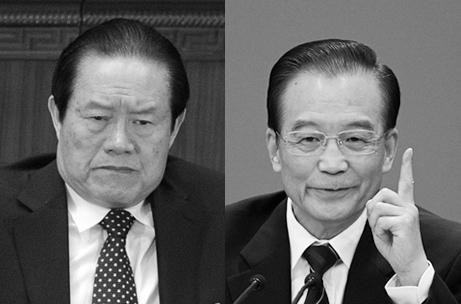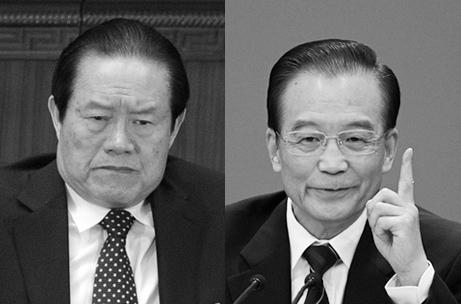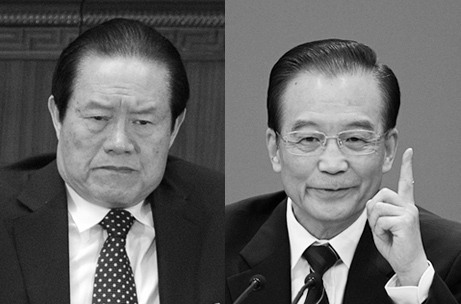The political struggle within the Chinese Communist Party has shifted into China’s property markets, with Zhou Yongkang and his faction attempting to set up the stage for political instability by artificially inflating China’s property bubble, according to a source. In response, leaders Hu Jintao and Wen Jiabao have attempted to reign in the market’s rapid growth through a series of property tightening measures that are clearly unpopular with local governments.
The Epoch Times has learned that Zhou and his key faction members want to accelerate the bursting of China’s property bubble to foment chaos and make it easier for hardliners to assert themselves. If that failed, the high housing prices alone would turn people against the Hu-Wen government, a source said.
During the explosion in real estate prices over the past decade the Political and Legislative Affairs Committee (PLAC), headed by Zhou since 2007, has used armed police and local roughs to demolish houses and clear land for sale to developers, driving up housing prices. Local governments also earn a large portion of their revenue through land sales.
Security forces also use the court system to auction real estate to companies who they then receive kickbacks from. These practices have brought money into the pockets of Zhou and his followers, the source said.
A recently disclosed case in Beihai City of Guangxi Province is illustrative. According to Boxun, an overseas dissident media, a syndicate of officials from the local judicial apparatus, including some high-ranking PLAC officials, have used a local intermediate court to auction real estate companies who they receive kickbacks from.
Click www.ept.ms/ccp-crisis to read about the most recent developments in the ongoing crisis within the Chinese communist regime. In this special topic, we provide readers with the necessary context to understand the situation. Get the RSS feed. Get the new interactive Timeline of Events. Who are the Major Players? ![]()
The Beihai Intermediate People’s Court sold properties at prices far below their market values to companies who bribed court officials. In a 2007 case, the court sold the city’s unfinished highest building at a price almost seven million yuan below market value. The vice head of the court was later found to have accepted a one million yuan bribe from the company that purchased the property. Developers then sell the houses onto the market.
There were 100 similar cases from 2000 to 2009, Boxun says, with 60 of them sold at below 50 percent of the market price. The “Dongbei gang,” as the syndicate was colloquially referred to, were rumored to have made over 10 billion yuan through such transactions. As a result of the market manipulation real estate prices in Beihai increased at a very rapid pace, Boxun says.
Zhou, the right-hand man of former Party head Jiang Zemin, is widely believed to be at the brink of losing power following the fall of his associate Bo Xilai.
A source in Beijing told The Epoch Times that in a recent meeting of the CCP’s Politburo, Wen Jiabao proposed putting Zhou under investigation.
Afterwards, The Epoch Times learned that Zhou Yongkang, Zeng Qinghong (the head of the National People’s Congress), and their supporters held another meeting to discuss countermeasures against Wen. One of the measures was to inflate housing prices.
Hu and Wen have tried to keep prices under control. Speaking during a May 20 economic seminar in Wuhan City with senior officials from six provinces, Chinese Premier Wen Jiabao urged local governments to carry out property tightening measures launched by the central government to stabilize China’s property market.
Since the interests of local officials are deeply planted in the real estate market, the central government’s property tightening policies have met with resistance, and have had little effect on housing prices.
Though stringent home purchase restrictions implemented in 2011 slowed housing price growth to a degree, local governments sought ways to bypass the restrictions. Since July 2011, 33 cities have launched programs aimed at negating or relaxing the purchase restrictions, which are likely to undermine the tightening policy. The source, who could not identify himself, said that this resistance by local governments was encouraged by Zhou Yongkang.
When Chongqing’s former top cop, Wang Lijun, fled for his life to the U.S. Consulate in Chengdu on Feb. 6, he set in motion a political storm that has not subsided. The battle behind the scenes turns on what stance officials take toward the persecution of Falun Gong. The faction with bloody hands—the officials former CCP head Jiang Zemin promoted in order to carry out the persecution—is seeking to avoid accountability for their crimes and to continue the campaign. Other officials are refusing any longer to participate in the persecution. Events present a clear choice to the officials and citizens of China, as well as people around the world: either support or oppose the persecution of Falun Gong. History will record the choice each person makes.
Read the original Chinese article.
The Epoch Times publishes in 35 countries and in 19 languages. Subscribe to our e-newsletter.






